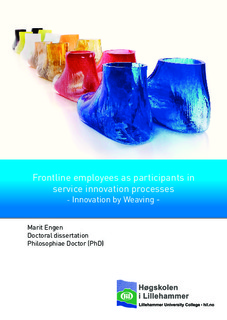| dc.description.abstract | Innovation is today a phenomenon that is promoted in private and public organizations as a critical success factor for growth and survival. Early work on innovation primarily focused on R&D and technology as the main drivers of innovation within an organization. This has shifted towards viewing innovation as a more interactive and open process, involving different actors across different practices, organizations and sectors. This thesis is concerned with frontline employees as actors in service innovation. It aims to develop new understanding of how frontline employees are engaged, and act in service innovation processes. The overall purpose is to contribute knowledge of frontline employees as participants in service innovation processes.
This thesis argues for a balanced approach to innovation, innovation with care, as a framework to view and discuss frontline employees as actors in bottom-up, practice-based processes and in top-down, strategic-based processes. The empirical studies, presented in four appended papers, investigate employees’ innovation activities by studying the micro processes they are engaged in, in particular the interactions between employees and managers, between employees themselves, and between employees and customers. The findings place frontline employees as valuable actors in both strategic-, and practice-based innovation processes. The employees’ gain knowledge in the customer-supplier interface. This knowledge together with their knowledge of the organization,
is combined into new and useful solutions for the customers and/or the work
practice. In top-down processes frontline employees actions are based on invitation by
management, while in practice based innovation processes, employees innovate when
having access to resources and/or by collaborating with managers.
The role of the participant, as described in the thesis, is one that gives the employees influence on their innovation activities, and the option to follow up on how the activities will affect their work practice and the organization. Frontline employees are found to exercise agency through three aspects: their workplace-related knowledge and skills, their interest and motivation to continuously improve their workplace and their access to resources. Here, the aspects are emphasized as the employees’ ability, willingness and opportunity to contribute.
By understanding how frontline employees practise agency is influenced by management, this thesis contributes to the understanding of how employees become participants in service innovation.
This thesis argues that agency is exercised in practice-based innovation processes, where frontline employees initiate, develop and enact new solutions. Middle managers are identified as having significant enabling roles as gatekeepers, translators and facilitators.
Innovation by weaving is introduced as a metaphor to symbolize how new ideas emerging from different sources are thought of as threads woven into the existing structure in order to develop new patterns. The concept demonstrates accordingly how employee-based ideas and their innovation activities can become part of organizational innovation management through the roles of the middle managers. | nb_NO |
